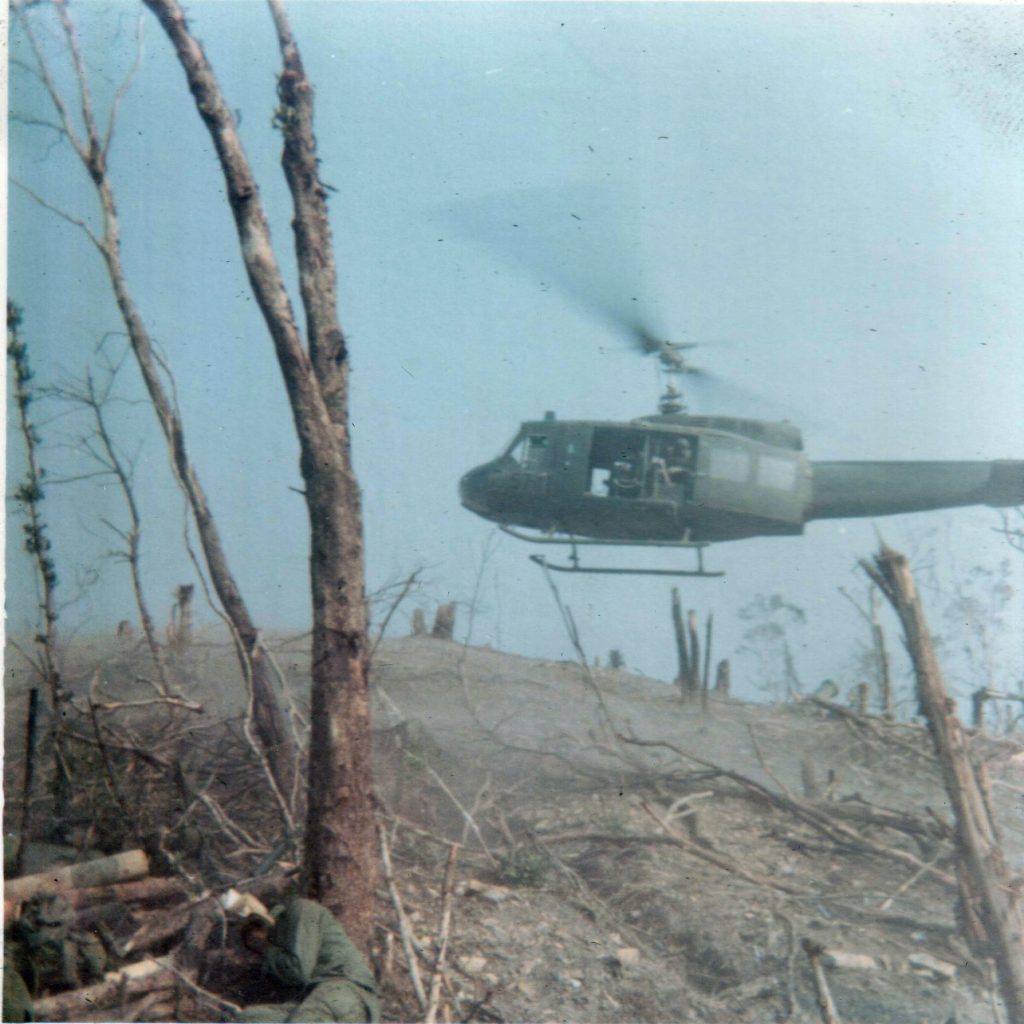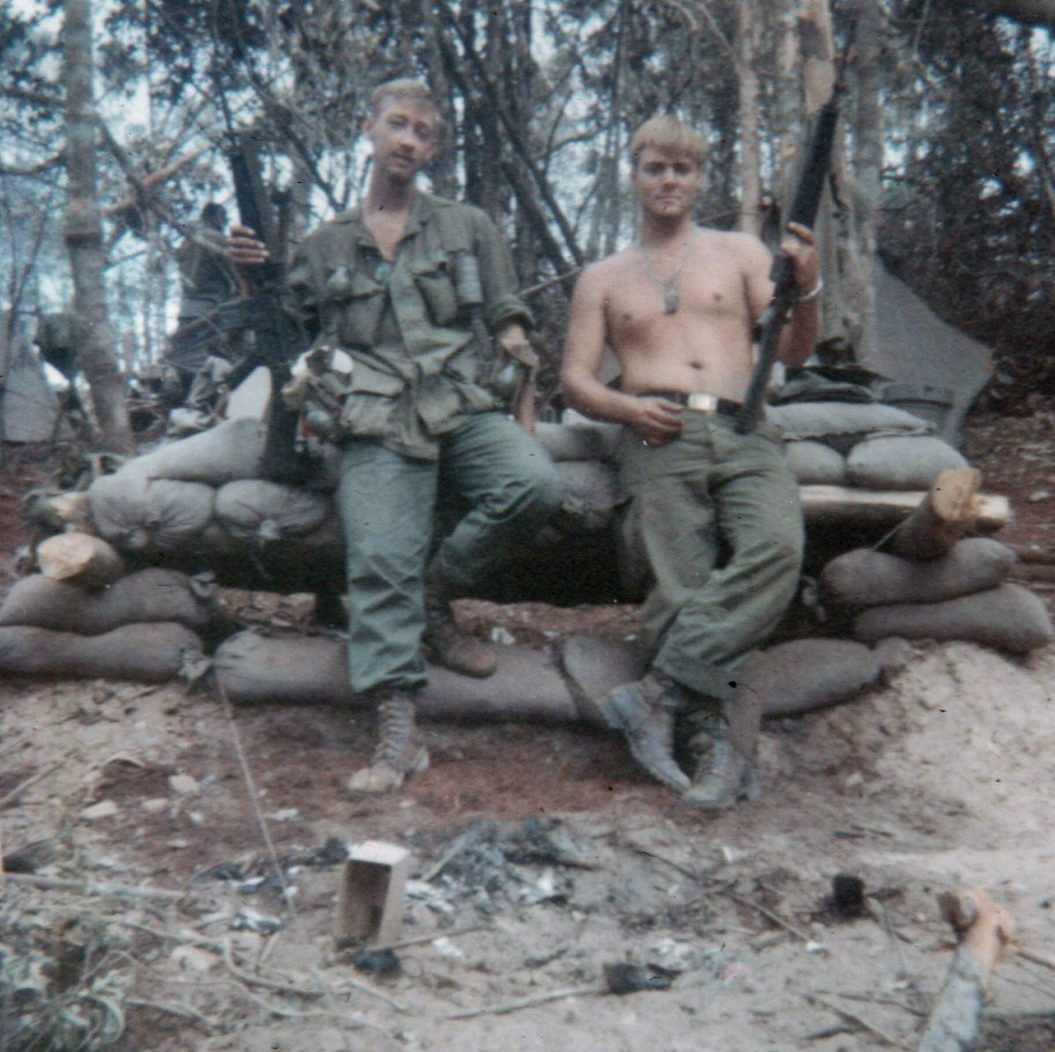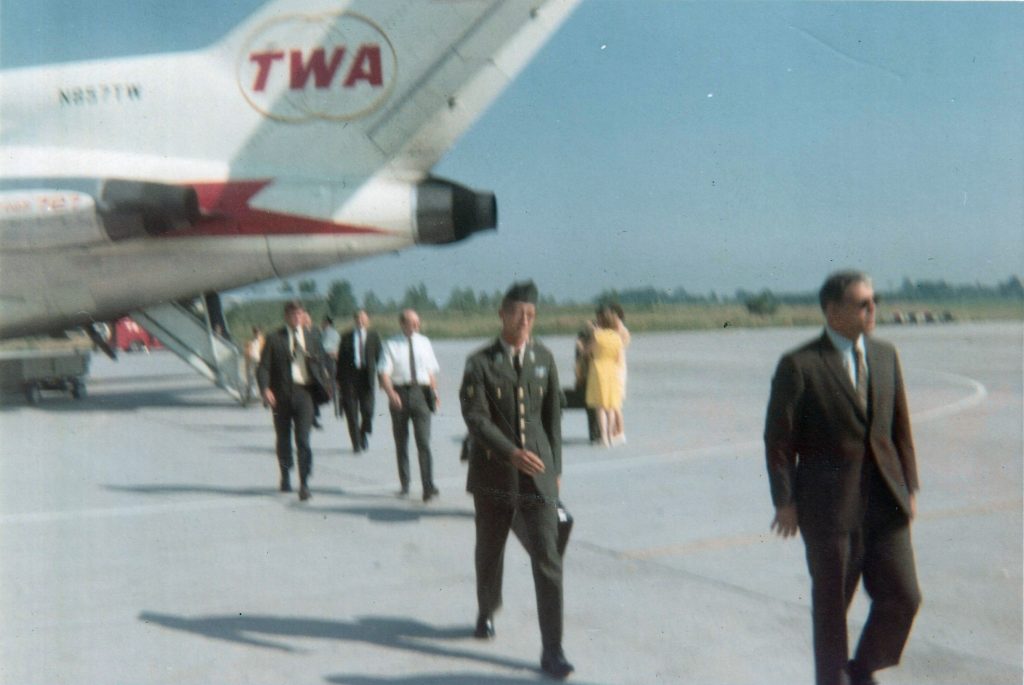Knoxville’s Gerald McGinnis looks back on his service in Vietnam
From Rambo to Heartbreak Ridge, Full Metal Jacket, Apocalypse Now, and even Forrest Gump, Hollywood writers have worked hard to out-script each other in portraying the havoc and heroism of America’s Vietnam War. Yet it’s doubtful even the most Oscar-decorated storyteller could concoct anything so harrowing as the ferocious battle that U.S. Army Specialist Four Gerald McGinnis fought in the wee hours of March 22, 1968.
Picture the scene: In the pre-dawn darkness, McGinnis, a member of Company C in the 3rd Battalion of the 8th Infantry Regiment, is bunkered at Firebase 14 (a.k.a. Firebase Incoming) atop a ridge surrounded by Vietnam’s Central Highlands jungle.
McGinnis occupies one of several bunkers along the perimeter, a first line of defense. Sudden firing shakes them to action. Some 1,500 North Vietnamese Army (NVA) troops are mounting an attack up the hill to the base.
Gunfire and explosions ring out. As McGinnis seeks to exchange fire, the bunkers on either side of his are hit—one by the NVA, the other after the base command orders an artillery strike on the outskirts where the base was breached. A number of soldiers are killed instantly or critically wounded. His bunker becomes the primary line of defense.
While the fight continues, three injured soldiers take shelter in McGinnis’ bunker. One has suffered an eye injury and is wrapped in bandages, blind to his surroundings. Another had a tricep torn off and is unable to fight. The third is in the most serious condition.
McGinnis defends their lives as the battle rages, even supporting an IV drip for the gravely wounded man while firing rounds with his M-16 rifle and tossing grenades at enemy combatants. He talks to the wounded soldier at his feet, trying to keep him alert.
Some four hours later, when the sun finally rises, the NVA troops have been rebuffed, prevented from overrunning Firebase 14 in large part by the efforts of Staff Sgt. McGinnis.
As recorded by several witnesses who later wrote letters commending McGinnis for his bravery, 167 enemy soldiers lay dead—30 to 40 of them within 10 yards of McGinnis’ bunker. Most were killed by small-arms fire out of his bunker.
The battle is over. A hero on the hill has protected his base and the lives of his comrades.
Escape Attempt
McGinnis’ tour in Vietnam had begun less dramatically than this but more soberly, with a jolt and a sinking fear that the horrors of war awaited him.

Almost immediately after his unit arrived at base camp in August of 1968, “I heard an explosion and ran over to the concertina wire fence. Hanging there, from the knee down, was part of a leg with a foot on it.” The soldier had stepped on a deadly M18 Claymore mine and had died in the explosion. “I found out he only had two weeks left in-country,” McGinnis says. “Psychologically, I started thinking, I’m not gonna go home from here.”
At that moment, McGinnis might have questioned the motivation that had led him into the fray in Vietnam. Born September 21, 1947, the Knoxville native and Fulton High School graduate was “a young man without much idea of what I was getting into” when he joined the Army in 1967. “I was running away from a relationship, and that’s not usually a good reason to do anything,” he says.
McGinnis was “real wild” as a teen, graduating from racking balls in a pool room in Happy Holler off North Central Pike to running with a rough crowd. “I gambled, fought—I was a hoodlum,” he says. His father was mostly absent, having been in and out of jail, and Gerald had “moved about 20 times by the age of 19. I had a tender heart, but I thought I had to be rough and tough. I was dating a girl who tried to run me over in a car. She was crazier than I was, and I was really crazy.”
As an attempt to get away from the girl and other aspects of his checkered childhood, McGinnis went to enlist in the Army and was almost turned away because of a hernia. Undeterred, he saw a doctor to repair it and six weeks later packed his duffel for basic training. A “rude awakening” to military life began with a 3:30 a.m. arrival at Fort Benning, Georgia, where the screaming of drill sergeants pierced the pre-dawn air. “It was a lot of taking orders and obeying to learn discipline, the usual welcome into Army life.”

After basic, the teen was shipped to Vietnam, where in short order he understood the benefit of the rigorous regimen he had encountered at Fort Benning. “When you go into combat, you learn that your very life depends on how you can receive an order and, not too much later, how you can give an order,” he says. “You have to grow up quick.”
In light of the two accounts of his war experience described earlier—the sight of a leg in the fence and the attack on Firebase 14—it might be surprising that McGinnis looks back on his military service as “a real good experience for me. Because I was wild growing up and got in a lot of trouble, I needed the structure and organization that the Army taught me.”
There were other painful moments in Vietnam, to be sure. Exhaustion set in after 11 months without any R&R. One of McGinnis’ closest friends, William Earl Bridges of west Knoxville, was killed in November of 1968. “I heard about it over instant potatoes at our Thanksgiving dinner. That was pretty traumatic.”
Yet there were positives as well: “sitting around the guys singing country songs and talking and laughing. We would always drink a lot back then, and pot was pretty easy to get.”
Foxhole friendships helped to sustain him. “If you don’t become buddies, you won’t make it. You watch each other’s backs. You’re willing to die for each other. You sleep in a little tent, share secrets, talk together. It’s a brotherhood.”
Homecoming
After returning from Vietnam, McGinnis says he “didn’t talk about it for quite a while. It was the most unpopular American war. There were protests and harsh words about those of us who had served. That didn’t happen to me, but it did to others I knew, so I kept mostly quiet.”
He came back to Knoxville but traveled around a bit, even experiencing a taste of the late-1960s counterculture movement. “I was at Haight-Ashbury,” he says of the epicenter of what he remembers as “the Hippie movement. I wanted to party and have a good time.”
Eventually he found faith—or it found him. “The Lord met me, and I was radically saved,” he says. His conversion led to a theological education, an assignment as a pastor of a church in Union City near Reelfoot Lake in 1976, and a return to Knoxville in 1980, when McGinnis founded Park West Church on Middlebrook Pike. He continues to serve as Director of Leadership Development. His son, Dr. Jeremy McGinnis, has followed in his father’s footsteps as Lead Pastor, and several other family members serve on the church’s staff.
Family is a big part of his life. This only child growing up in North Knoxville today has seven grandchildren. “We’ll have 14 to 16 people around the house for family dinner on Fridays,” McGinnis says with a warm smile, “and 25 or 30 at Christmas.”
Over the years, McGinnis did begin to speak about his time in Vietnam. And it took quite a while, but the heroism he displayed from his ridgetop bunker in1968 has gained him a measure of appreciation. In 2016, he was awarded the Bronze Star for his brave actions in Vietnam, and in October 2021 he was awarded the Silver Star.
In a spirit of humility consistent with military veterans who have received similar accolades, McGinnis downplays the singularity of the honors and credits his fellow soldiers in his unit and battalion—especially those who gave the full measure of devotion and did not return home as he did.
“I don’t need any more gratitude. I would rather it go to other veterans in our area who were just as devoted or more,” he says, listing off some of the ways he says he has been blessed in abundance. “I’ve got all kinds of accolades. I’m supported by a strong church family. I’ve gone to two seminaries and have my doctorate. I worked for the FBI as a chaplain, for the Knox County Sheriff’s Department 22 years as a chaplain, and had the opportunity to provide trauma counseling for some of our veterans.

“But most of the vets do not have that kind of experience. They don’t get the applause. Some of them went into the Army because they were less educated, and they ended up in the infantry, or drove a truck, or served as a nurse or a supply sergeant. They might have felt expendable, but they were not. I think it’s good for Knoxvillians to show gratitude, and I appreciate the many ways we see that here.”
The annual Veteran’s Day parade is one example of that, he cites. One specific honor that hit especially close to home was bestowed in the fall of 2021 at his alma mater, Fulton High, when local leaders unveiled a monument to fallen Vietnam veterans Alvin Wiles and Billy Dale, along with several other FHS graduates who died in the service.
“I’m not real emotional, but that was something special for those soldiers,” he says.
Reflecting on his time in the Army and the war, McGinnis speaks of the contrast in the way he and his fellow vets were received in the 1960s and 70s with the warmer welcome they and other US military personnel have been greeted in recent years. The shift “has caused two kinds of emotions in a Vietnam vet,” he says, “being thankful for the way our military is perceived now but grieving that he never got that welcome home. Nobody said thank you at the time.”
Having been thanked and having had the opportunity to thank many of his fellow veterans, McGinnis stands on the solid ground of humble gratitude: “I’m proud to be a veteran, proud to be an American, and proud for what we did to serve our nation.”

Comments are closed.